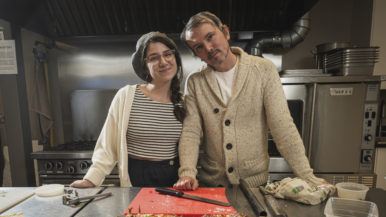The Orthodox Jew who became a gender-reassignment surgeon

I attended an all-boys, Orthodox Jewish high school in Toronto, where sex ed largely consisted of our rabbi telling us how God would punish us for our sexual sins. Masturbation, we were told, was a crime so terrible that those of us who did it would spend eternity suffering in a vat of boiling semen. The image was enough to turn me into an abstainer throughout high school and during my years at an Israeli yeshiva. In my early 20s, I went to my rabbi to get permission to provide a sperm sample for a medical test. “Yonah,” he said, “go crazy.”
So maybe it’s ironic—or maybe not—that I’m now a urologist, practising in the areas of erectile dysfunction, sexual dysfunction and trans bottom surgery. I found my niche in 2012, when I met my mentor, Ethan Grober, a doctor who’d been working with trans patients for years. He was able to connect with patients, talking to them casually about their most intimate details. He made me realize I wanted to do gender-reassignment surgery. I love helping patients feel more comfortable in their own skin. I also love that most urological problems can be fixed quickly: if I get called in because there’s a kidney stone, I insert a tube to unblock it. If somebody’s testicles are twisted, I go in and untwist them.
I work out of Women’s College Hospital, where I perform orchiectomies, or the removal of the testicles, for trans women who want to stop using testosterone blockers. If a patient thinks she might want a vaginoplasty—the surgical creation of a vagina—I leave the skin of the scrotum to construct labia later. For trans guys, we do testicular implants. We’re the second program in Canada to perform bottom surgery, after a private clinic in Montreal. Our goal is to be able to offer the first vaginoplasties in Toronto by the end of 2018, with phalloplasties to follow later on.
I’m still an Orthodox Jew. I have faith. I keep kosher, I wear a kippah to work, and I pray every morning. I put on phylacteries, because that’s what my father does and what my grandfather did when he was hiding out in an attic during the Holocaust. I’m at synagogue on Saturdays, but if my pager goes off, I drive in to the hospital, because saving a life supersedes the Sabbath. Many people I meet believe that my faith is at odds with my career. But my work allows me to practise the medicine that interests me while helping a marginalized community. I deal with patients who, by and large, have had negative experiences with hospitals and the health care system, and I give them the care they deserve. That is very much in line with my religious practice.
My parents are observant yet socially progressive, and religious practice for me has always been associated with social justice and activism. I love my Jewish traditions. I believe they’re important tools to help navigate the ethics of contemporary life. And the values we read about in the Bible—that we’re obligated to help the immigrant and the stranger and the convert—are fundamentally consistent with helping people with gender dysphoria.
Strange as it sounds, I’ve never really thought about the religious technicalities regarding Jewish law and gender dysphoria. At the age of 32, I no longer turn to the rabbinate for approval of every decision I make. Every week at shul, I’m introduced as the guy who changes men into women and women into men. Some people say things like, “I can’t believe you’re mutilating people,” or, “Those people are crazy.” They’ll tell me that my patients are just depressed. They’ll tell me about studies they’ve read showing that people who get gender-reassignment surgery ultimately regret it.
A friend’s father told me he worried that I wasn’t aware of the biblical prohibition on castration. I wasn’t sure how to respond. I mean, there isn’t much room for nuance in an ancient text written in a foreign language. My sense is that there might be some differences between castration as a genocidal tactic versus orchiectomy as a treatment for someone who is born in the wrong body.
And that is the real source of discomfort: many Orthodox people see gender-affirming surgery as an admission that God made a mistake. They see me as calling God out on that mistake by correcting it. Which is odd: nobody’s accusing God of screwing up someone’s pancreas when they have diabetes or suggesting it’s a sin to inject insulin.
I can’t prove there’s a God, but I believe there is. I also believe that God must be very frustrated by how the LGBT community is marginalized. I operated recently on a gentleman who has been transitioning for 15 years. After his experience at Women’s College, he sent an email that said, “I’ve always hated doctors, but you guys were able to make the experience palatable.” Another patient told me that we were the first doctors who didn’t treat her like a freak. People are so appreciative when we use their correct names and pronouns. That’s the idea behind our program: taking something that’s broken, and transforming it into something brighter and whole. And that, fundamentally, is what religion is supposed to do.
—As told to Susan Goldberg
Yonah Krakowsky is a urologist specializing in sexual medicine at Women’s College Hospital.
Email submissions to memoir@torontolife.com





